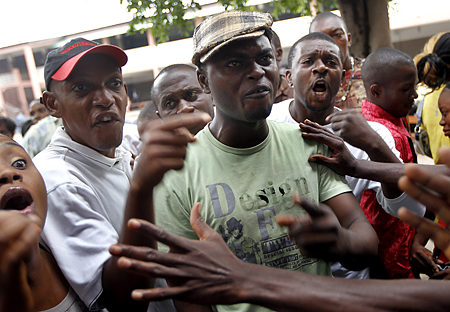
Voters argue with election officials over delayed poll opening at a polling station in Kinshasa, Congo, Monday Nov. 28, 2011. (Photo: Jerome Delay / AP)
When the Democratic Republic of Congo held its first multiparty general election for 41 years in 2006, the event was hailed as a milestone on the slow march out of civil war and towards functionality for the world’s largest failed state. Five years later, as the country holds another poll, the naivete of the Western belief in elections as a fix-all has been rarely more exposed.
The 2006 vote, it turned out, did nothing for Congo’s development. In the latest U.N. rankings on human development, the D.R.C. placed flat last, 187th out of 187 countries. The U.N. Development Program, which publishes the annual list, added that in a life the average Congolese can expect to last just 48.4 years, he or she will go to school for a median 3.5 years and earn $280 a year.
Nor did a democratic mandate do much to encourage the beneficence of Joseph Kabila’s government. Corrupt, with a remote and inaccessible President and a state structure whose existence barely registers across much of the country, Kabila’s administration has almost no record in office to point to. In the vast roadless, lawless expanse of jungle and forest that Congo remains, all manner of bad behavior thrives. Mines for gold, copper and the minerals needed for electronics thrive on slave labor in the D.R.C., many of them owned by private militias who use them to buy arms and pursue insurrection. Official corruption has a hand in those, plus illegal timber felling, and wildlife poaching. In particular, the D.R.C. has garnered itself an unparalleled record for rape, both horrifically widespread and horrendously systematic, with a new mass assault by soldiers or civilians coming to light every few months this year. Even aid efforts, largely concentrated around the town of Goma in the east, have become synonymous with the kind of inefficient, self-serving operations that so besmirch the name of foreign assistance. That said, it is another indictment of the state that what visible improvements there have been — new Chinese-built roads in the capital Kinshasa, an effective Western-run anti-malaria program — are almost entirely due to foreigners.
This year’s U.N.-assisted poll might even set Congo back further. Instead of serving as an outlet for political expression, the election has become both a symptom of the D.R.C.’s dysfunction and a focus for popular frustration. Eight people have died in political violence, which has also seen polling stations attacked and burned. Ballot papers are still arriving in some polling stations today, two days after polls were meant to have closed. Opposition parties are claiming to have seen boxes of ballots pre-marked in favor of the incumbent Kabila, prompting four of the 10 opposition presidential candidates to demand the election be annulled. The U.N. has added one parliamentary candidate to its sanctions list, accusing him of organizing mass rapes in eastern Congo in 2009. Meanwhile the main opposition candidate, Etienne Tshisekedi, has asked his supporters to “terrorize” the government and unilaterally declared himself President even before a single vote was cast. Whenever results are finally released — the best guess is around a week from now for the presidential vote and January for the parliamentary one — the scene is set for a showdown, possibly violent, and likely with a secessionist element. (Tshisekedi draws much of his support from tribes in Congo’s south, where much of the country’s economy is based).
But what’s the alternative? As the veteran BBC foreign correspondent Humphrey Hawksley writes in his book Democracy Kills: What’s So Good About Having the Vote?: “Poverty, ethnic and religious differences, corruption, land disputes, history and venal leaders make full electoral democracy a very risky system for some societies. Yet, at the same time, people want their governments to deliver and they want to be able to speak out without fear of punishment.” Winston Churchill famously remarked that democracy was “the worst form of government except all those other forms that have been tried.” In Congo’s case, with its history of brutal colonialism, dictatorship and war, that’s still true — but also still not much of an answer.

